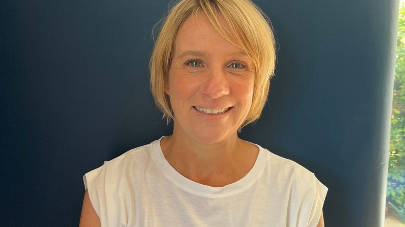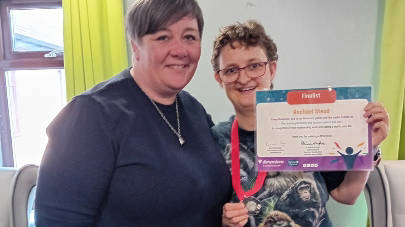- Home
- News & events
- Blog
- Emily shares how our enABLE network teaches people how to advocate for themselves
7 October 2024
Emily shares how our enABLE network teaches people how to advocate for themselves
My name is Emily, and I first joined Anchor in 2016. I’m the Resident Wellbeing Officer at Anchor and love how involved I can be with residents in my role. I am also a member of our enABLE Network for colleagues with disabilities, neurodivergence, and long-term health conditions. 
I’ve known I was dyslexic from a young age. I was diagnosed in school when I realised I was struggling with things more than other students, but it mainly impacted me in secondary school. I showed more stereotypical signs of dyslexia – things like getting my ‘d’s and ‘b’s the wrong way round, finding spelling hard, etc – but when I moved up in school, it was my working memory that I found hardest to manage. It meant I wasn’t able to memorise things like times tables and the methods I needed for my exams, but it was the attitude around dyslexia that had the biggest impact.
I remember the principal at the time saying, “There’s no such thing as dyslexic children, just lazy ones,” and that mindset was common. My mum was amazing, though, and fought for me to move school to somewhere much more tolerant. I got a tutor which meant that I got my GCSEs, but I was always under the impression that higher education wasn’t for me. The language used around me at parents’ evenings was awful: I felt defeated and that I wouldn’t amount to anything.
A real turning point happened in my 20s. I was working in a school to support children with disabilities or special educational needs, and a dyslexia specialist came in to give a talk to the students. It was a light bulb moment. Someone was telling me that I wasn’t stupid and that there were wider impacts to being dyslexic. It took such a weight off and was so affirming to hear. I did a lot of reflection and research, and in that I’ve learned to appreciate my strengths like thinking creatively and problem-solve quickly. I also love reading, which people might not expect, and I’m great at speed reading!
Dyslexia is a huge spectrum like any other neurodivergent condition, and all the common knowledge about it is fairly out of date and seems to stop in school. There are some adjustments that are often suggested – things like different coloured paper, and rulers to help reading – but the range of dyslexia means that there’s much more that could help people.
I have learned some little adjustments and adaptations to help me at work, such as providing and requesting follow-up emails to refer to and asking colleagues to check things through, but something I found what helps most is being open about it, even if that feels vulnerable sometimes. I am aware of what makes my symptoms worse (being tired, stressed, anxious) and so I know that I need to be aware of that and grant myself a little grace.
How our enABLE network helps colleagues advocate for themselves
Despite lots of progress, dyslexia is still downplayed, but the enABLE network help to educate and teach people how to advocate for themselves. In a workplace, I think everyone should have a decent understanding of dyslexia. Around 10% of the UK population is dyslexic, so managers and colleagues should be as understanding of it as they would be for any other disability.
Learning a bit more is never a bad thing, so I’d urge people to dig a little deeper into what dyslexia is. You’d be doing a great service to anyone you know by developing your empathy and understanding.
Emily Difiori is a Resident Wellbeing Officer at Anchor
Our approach to Diversity and inclusion
At Anchor we aim to make diversity and inclusion an everyday reality and ensure that dignity and respect are central to the way we work. Find out more about our approach to Diversity and Inclusion here.
Read more about diversity and inclusion at Anchor
This website uses cookies which track activity so that you get the best possible experience. By continuing to use this website we will assume you are happy and cookies will be set. You can change your cookie settings at any time.















